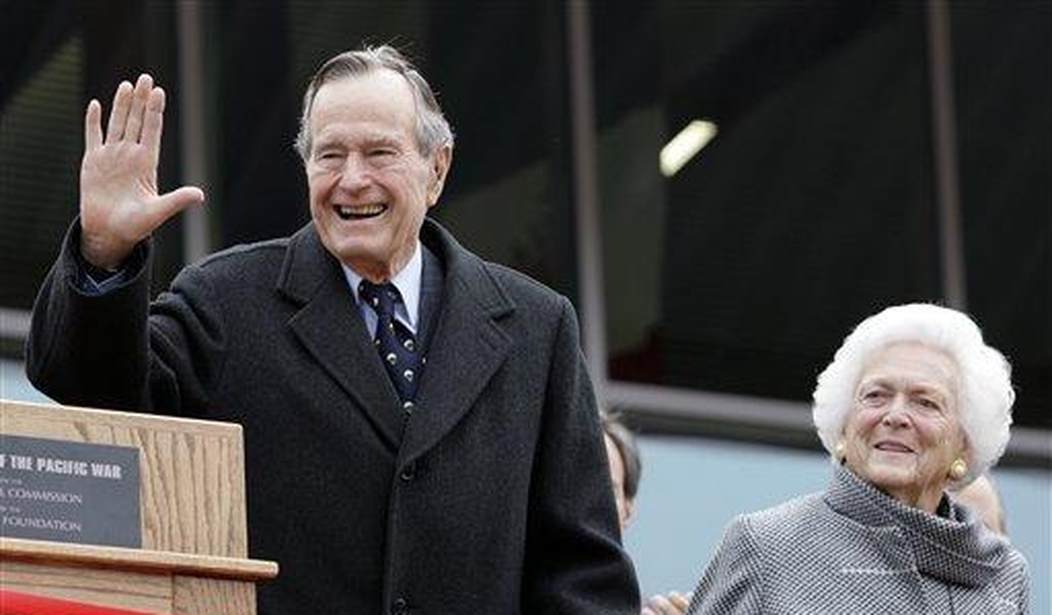I will always fondly remember from my political career two individuals. They were different as night and day. One a Republican president who became my friend and the other a Democrat born in Connecticut who would become my congressional role model - even though I never met him as I was in high school when he left office. Both men served in Congress together and are associated with Black History Month.
President George H.W. Bush and the flamboyant Rep. Adam Clayton Powell Jr. were both giant supporters of civil rights but not given their due credit.
Bush voted for the Civil Rights Act of 1964 as a member of the House and signed into law the Civil Rights Act of 1991 as president. His 1964 vote as a congressman probably cost him the election for the Senate soon thereafter in Texas.
He recognized the talents of both General Colin Powell and Condoleezza Rice, both future secretaries of state. He will always be my favorite president.
The other gentleman is Congressman Powell. It was the Powell Amendment, which became part of the Civil Rights Act of 1964, that scared racist politicians, mostly Democrats, to their knees. Imagine losing federal funds for discriminating against descendants of slaves. Sadly, some white people today would also find that distasteful.
The Civil Rights Act of 1964 explicitly requires a return of federal funds received for those who break employment laws; it also prevents those entities or individuals from receiving new federal funds. Taxpayers should not reward those who break the law.
In 1990 while campaigning in my hometown, Bush said to my 92% white congressional district that electing me to Congress was important to the nation. Winning in an overwhelmingly white congressional district as an African American would be a first. Imagine where that could lead?
During my first days in Congress I had a large press following and appeared on numerous TV and radio shows. At 37, I was the shining new penny. House Speaker Tom Foley said to me that I easily surpassed the attention given to any freshmen in quite some time.
My first task as a member of Congress started when I was a candidate for the seat. I voiced my opposition to the Civil Rights Act of 1990. This drew great outrage in Connecticut, but my track record as the lone Black member of the Board of Aldermen in Waterbury gave me the credibility I needed to survive criticisms from members of the Black community. I promised to work to pass a better civil rights act.
President Bush and especially First Lady Barbara Bush suggested I not "fall on the sword" for "Georgie" on the Civil Rights Act of 1990. She actually told my mother while campaigning for me in Newtown, CT that she did not think my opposition to the act would help me get elected.
Sure enough, I was forced to cast an early vote on the 1990 bill in the early part of 1991. I voted against it. Back to the drawing board.
Giving me greater clout, the Republican Conference made me chairman of the newly created Civil Rights Task Force as the lone Black Republican in Congress.
I worked relentlessly with all factions of Congress, House and Senate, and we got the 1991 Civil Rights bill passed through both chambers and signed by Bush. Rep. Henry Hyde was fantastic and deserves far more credit than me. We not only got it done, it was accomplished in a historic manner. No civil rights bill in U.S. history passed by such a large margin.
Civil rights have always been a major concern for me and I have shared that concern with my children. We cannot just stand by and say or do nothing when God puts us in a position to help others. Doing so would be like burying your talents.
It was the "stick" I used as a young mid-level manager at three Fortune 500 companies. No one wanted to have a surprise EEO (Equal Employment Opportunity) audit and fail. Hundreds of millions of federal dollars could dry up overnight.
Problem - today EEOC surprise audits are nonexistent as the staff for that agency is half of what it used to be in the '80s even though the growth of industry in general has increased by 50%.
Therein lies the problem. When it comes to racial matters we do not need new laws; we do not need new programs. All we need to do is follow and enforce the 1964 Civil Rights law that forces companies to be fair to everyone.
There should not be separate policies and procedures for white people and de facto racist policies and procedures for Black people. Two water fountains and two restrooms are Jim Crow.
Lipstick on a pig does not alter the fact that it is a pig, But if no one is looking - oh well - everything looks good. You could get away with murder.
In the Bible, Sirach (Chapter 34, verses 25 & 26) says: "To take away a neighbor's living is to commit murder; to deprive an employee of wages is to shed blood."
George H.W. Bush and Rep. Adam Clayton Powell on Civil Rights
The opinions expressed by columnists are their own and do not necessarily represent the views of Townhall.com.

Advertisement
Recommended
Trending on Townhall Videos
Advertisement
Advertisement
Advertisement
























Join the conversation as a VIP Member